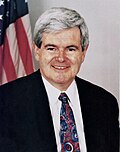History
Rather than campaigning independently in each district, Republican candidates chose to rally behind a single national program and message fronted by Georgia congressman and House Republican whip Newt Gingrich. They alleged that President Bill Clinton was not the "New Democrat" he claimed to be during his 1992 campaign, but was a "tax and spend" liberal. The Republicans offered an alternative to Clinton's policies in the form of the Contract with America. [2]
The gains in seats in the mid-term election resulted in the Republicans gaining control of both the House and the Senate in January 1995. Republicans had not held the majority in the House for 40 years, since the 83rd Congress (elected in 1952). From 1933 to 1995, Republicans had controlled both House and Senate for only four years. From 1933 into the early 1970s, most white conservatives in the South belonged to the Democratic Party, and created the Solid South bloc in Congress. Most African Americans in the South were disenfranchised in those years, based on anti-Black laws and subjective administration of voter registration practices.
By the mid-1990s, white conservatives from the South joined Republicans in other parts of the country, leading to the change in Congress. Large Republican gains were made in state houses as well when the GOP picked up twelve gubernatorial seats and 472 legislative seats. In so doing, it took control of 20 state legislatures from the Democrats. Prior to this, Republicans had not held the majority of governorships since 1970. In addition, this was the first time in 50 years that the GOP controlled a majority of state legislatures.
Discontent with Democratic candidates was foreshadowed by a string of elections after 1992, including Republicans winning the mayoralties of New York and Los Angeles in 1993. In that same year, Christine Todd Whitman won the New Jersey governorship. Bret Schundler became the first Republican mayor of Jersey City, New Jersey, which had been held by the Democratic Party since 1917.
Republican George Allen won the 1993 Virginia gubernatorial election, and Texas Republican Kay Bailey Hutchison won a U.S. Senate seat from the Democrats in the 1993 special election. Republicans also picked up three congressional seats from Democrats in Oklahoma and Kentucky in May 1994.
On November 9, 1994, the day after the election, Senator Richard Shelby of Alabama, a conservative Democrat, changed parties, becoming a Republican; on March 3, 1995, Colorado Senator Ben Nighthorse Campbell switched to the Republican side as well, increasing the GOP Senate majority. [3]
This page is based on this
Wikipedia article Text is available under the
CC BY-SA 4.0 license; additional terms may apply.
Images, videos and audio are available under their respective licenses.





